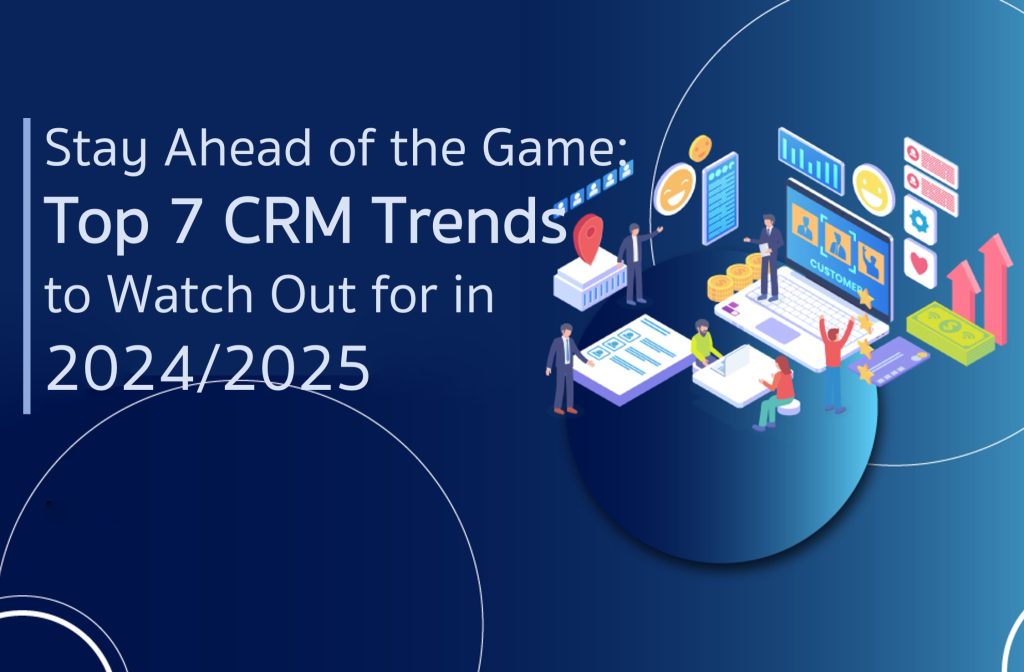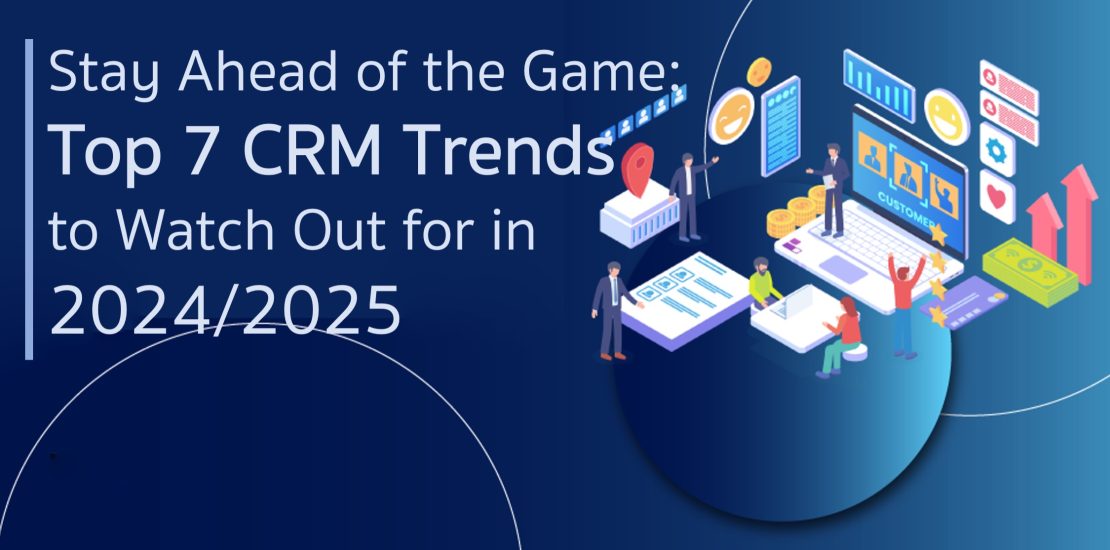Stay Ahead of the Game: Top 7 CRM Trends to Watch Out for in 2024/2025

In the fast-paced world of customer relationship management (CRM), staying ahead of the game is essential. As we look forward to 2024/2025, it’s important for businesses to keep their finger on the pulse of the latest trends in this ever-evolving industry. From the rise of artificial intelligence to the increasing focus on personalization, there are several key CRM trends to watch out for in the coming year.
One of the main driving forces behind the future of CRM is the integration of AI technology. With the ability to analyze vast amounts of data, AI-powered CRM systems can help businesses gain valuable insights and automate various processes.
Another trend to look out for is increased personalization. With customers craving tailored experiences, businesses need to find innovative ways to deliver personalized interactions across multiple channels.
Mobile CRM is also set to make waves in 2024/2025. As more people rely on their smartphones for work and personal tasks, businesses need to ensure that their CRM systems are mobile-friendly and accessible on the go.
These are just a few of the top CRM trends to keep an eye on as we step into 2024/2025. By embracing these emerging technologies and strategies, businesses can stay ahead of the curve and better serve their customers in the digital age.
Importance of staying updated with CRM trends
The landscape of CRM is constantly evolving, driven by advancements in technology and changing customer expectations. To remain competitive in today’s market, businesses must stay updated with the latest CRM trends. By keeping a close eye on emerging technologies and strategies, companies can leverage these trends to gain a competitive edge, improve customer satisfaction, and drive revenue growth.
Staying updated with CRM trends allows businesses to anticipate customer needs and deliver personalized experiences. By understanding the evolving preferences and behaviors of customers, companies can tailor their interactions and offerings to meet individual requirements. This level of personalization not only enhances customer satisfaction but also increases customer loyalty and advocacy.
Furthermore, staying updated with CRM trends enables businesses to optimize their internal processes and improve operational efficiency. By adopting new technologies and automation tools, companies can streamline their workflows, reduce manual tasks, and enhance productivity. This allows employees to focus on high-value activities, such as building relationships with customers and driving business growth.
In summary, staying updated with CRM trends is crucial for businesses to remain competitive, deliver personalized experiences, and optimize their internal processes. By embracing the latest advancements in CRM, companies can position themselves for future success.
Trend 1: Artificial Intelligence (AI) Integration in CRM
One of the main driving forces behind the future of CRM is the integration of AI technology. AI has the potential to revolutionize CRM by analyzing vast amounts of customer data and extracting valuable insights. With AI-powered CRM systems, businesses can automate various processes, improve decision-making, and enhance customer experiences.
AI integration in CRM enables businesses to gain a deeper understanding of their customers. By analyzing data from various touchpoints, AI algorithms can identify patterns, preferences, and behaviors. This valuable information can be used to segment customers, personalize interactions, and predict future needs. For example, AI-powered CRM systems can recommend personalized product recommendations to individual customers based on their browsing history and past purchases.
Another key benefit of AI integration in CRM is the automation of repetitive tasks. AI-powered chatbots, for instance, can handle customer queries, provide real-time support, and even process transactions. This not only improves response times but also reduces the burden on customer service teams, allowing them to focus on more complex and valuable interactions.
Additionally, AI-powered CRM systems can help businesses identify sales opportunities and predict customer churn. By analyzing customer data, AI algorithms can identify signals that indicate a potential sale or customer dissatisfaction. This enables businesses to proactively engage with customers, offer targeted promotions, and prevent churn.
In conclusion, the integration of AI in CRM brings numerous benefits, including enhanced customer understanding, automation of repetitive tasks, and improved sales and retention strategies. As AI technology continues to evolve, businesses that embrace AI-powered CRM systems will be well-positioned to thrive in the future.
Trend 2: Mobile CRM for on-the-go access
In an increasingly mobile-centric world, mobile CRM is set to make waves in 2024. With more people relying on their smartphones for work and personal tasks, businesses need to ensure that their CRM systems are mobile-friendly and accessible on the go.
Mobile CRM allows sales teams and customer service representatives to access critical customer information, update records, and communicate with customers from their mobile devices. This flexibility enables them to be more responsive, efficient, and productive, regardless of their location. For example, a salesperson can quickly access customer data before a meeting, update their progress immediately after the meeting, and follow up with the customer, all from their mobile device.
Furthermore, mobile CRM enables field sales representatives to capture data in real-time. By using mobile devices to record customer interactions, update contact details, and input notes, sales representatives can ensure that data is accurate and up to date. This real-time data synchronization also allows managers and other team members to access the latest information, collaborate effectively, and make informed decisions.
Another key advantage of mobile CRM is the ability to engage with customers on their preferred communication channels. With mobile devices, businesses can leverage various channels, such as messaging apps and social media, to connect with customers in a more convenient and personalized way. This multi-channel approach helps businesses meet customers where they are, provide timely support, and build stronger relationships.
In summary, mobile CRM is a trend to watch out for in 2024 as it enables businesses to empower their teams with on-the-go access, capture real-time data, and engage with customers through their preferred channels. By embracing mobile CRM, businesses can enhance productivity, improve collaboration, and deliver exceptional customer experiences.
Trend 3: Personalization and customization in CRM
In today’s digital age, customers expect personalized experiences across all touchpoints. As a result, personalization and customization in CRM have become key trends to watch out for in 2024. Businesses need to find innovative ways to deliver tailored interactions that cater to individual preferences and needs.
Personalization in CRM starts with gathering and analyzing customer data. By collecting data from various sources, such as transaction history, browsing behavior, and demographic information, businesses can gain insights into customer preferences and behaviors. This data can then be used to segment customers into specific groups, allowing for more targeted and personalized marketing campaigns.
Furthermore, businesses can leverage personalization in CRM to deliver customized product recommendations. By analyzing customer data, businesses can understand individual preferences and make relevant suggestions. For example, an e-commerce company can use CRM data to recommend complementary products based on a customer’s previous purchases or browsing history. This not only enhances the customer’s shopping experience but also increases the likelihood of cross-selling and upselling.
In addition to personalized marketing and product recommendations, businesses can also customize their customer service interactions. By capturing customer preferences and history in a CRM system, businesses can provide more personalized support. For example, a customer service representative can access a customer’s purchase history and preferences to provide more relevant and tailored assistance.
Overall, personalization and customization in CRM enable businesses to deliver tailored experiences that meet individual customer needs and preferences. By leveraging customer data, businesses can segment customers, personalize marketing campaigns, recommend relevant products, and provide customized support.
Trend 4: Enhanced data analytics and predictive modeling
Data analytics and predictive modeling are playing an increasingly important role in CRM. As businesses gather more data from various sources, the ability to analyze and extract valuable insights becomes crucial. In 2024, businesses should focus on enhancing their data analytics capabilities to gain a competitive edge.
Enhanced data analytics in CRM allows businesses to uncover patterns and trends in customer behavior. By analyzing data from multiple touchpoints, businesses can identify correlations, preferences, and buying patterns. This information can then be used to optimize marketing strategies, improve product offerings, and predict future customer needs.
Predictive modeling, on the other hand, takes data analytics a step further by using historical data to make predictions about future outcomes. By analyzing past customer behavior and outcomes, businesses can build predictive models that forecast future trends and behaviors. For example, a retail business can use predictive modeling to forecast customer demand for certain products, enabling them to optimize inventory levels and avoid stockouts.
Another key benefit of enhanced data analytics in CRM is the ability to measure the effectiveness of marketing campaigns and customer interactions. By tracking and analyzing key performance indicators (KPIs), businesses can evaluate the success of their marketing efforts, identify areas for improvement, and optimize their strategies. This data-driven approach allows businesses to allocate resources more effectively and achieve better ROI.
In summary, enhanced data analytics and predictive modeling in CRM enable businesses to gain valuable insights, optimize marketing strategies, predict customer behavior, and measure the effectiveness of their efforts. By investing in data analytics capabilities, businesses can make informed decisions, improve operational efficiency, and drive revenue growth.
Trend 5: Social CRM and leveraging social media data
Social media has become an integral part of people’s lives, and businesses can no longer ignore its impact on customer relationships. In 2024, leveraging social media data and implementing social CRM strategies will be crucial for businesses to stay ahead of the game.
Social CRM involves using social media platforms to connect, engage, and build relationships with customers. By monitoring social media conversations, businesses can gain insights into customer preferences, opinions, and needs. This information can then be used to tailor marketing campaigns, provide timely support, and engage with customers in a more meaningful way.
Furthermore, social CRM enables businesses to leverage user-generated content and social proof. By encouraging customers to share their experiences on social media, businesses can amplify their brand reach and credibility. Positive customer reviews and recommendations on social media can influence purchasing decisions and attract new customers.
In addition to monitoring social media conversations, businesses can also leverage social media data for targeted advertising. Platforms like Facebook and LinkedIn offer powerful targeting options that allow businesses to reach specific audiences based on their demographics, interests, and behaviors. By integrating social media data with CRM systems, businesses can create more targeted and personalized advertising campaigns, increasing their chances of success.
Overall, social CRM and leveraging social media data enable businesses to connect with customers on a more personal level, build brand credibility, and improve the effectiveness of their marketing efforts. By embracing social CRM strategies, businesses can tap into the power of social media and leverage it to their advantage.
Trend 6: Automation and workflow optimization in CRM
Automation and workflow optimization are key trends in CRM that businesses should pay attention to in 2024. As businesses deal with increasing amounts of data and customer interactions, automation becomes essential to streamline processes, improve efficiency, and deliver exceptional customer experiences.
One area where automation can have a significant impact is lead management. By automating lead scoring, routing, and nurturing processes, businesses can ensure that leads are handled promptly and efficiently. This reduces the risk of leads falling through the cracks and improves conversion rates. For example, an automated lead scoring system can assign scores to leads based on their behavior and demographics, allowing sales teams to focus on leads with a higher likelihood of conversion.
Automation can also improve customer service by providing self-service options and automating routine tasks. By implementing chatbots or virtual assistants, businesses can offer 24/7 support and handle common customer queries without the need for human intervention. This not only improves response times but also reduces the burden on customer service teams, allowing them to focus on more complex and valuable interactions.
Furthermore, automation can optimize sales processes by automating repetitive tasks, such as data entry, follow-up emails, and proposal generation. By reducing manual tasks, sales teams can spend more time building relationships with customers, identifying opportunities, and closing deals. This leads to increased productivity and revenue growth.
In conclusion, automation and workflow optimization in CRM enable businesses to streamline processes, improve efficiency, and deliver exceptional customer experiences. By automating routine tasks, businesses can free up time for more valuable activities, enhance productivity, and drive business growth.
Trend 7: Integration of CRM with other business systems
In 2024, the integration of CRM with other business systems will be a crucial trend to watch out for. Businesses need to break down silos and ensure that CRM is seamlessly integrated with other key systems, such as marketing automation, e-commerce platforms, and customer support tools.
Integration between CRM and marketing automation systems allows businesses to align their marketing and sales efforts. By integrating these systems, businesses can ensure that leads generated through marketing campaigns are seamlessly transferred to the CRM system for further nurturing and conversion. This integration also enables businesses to track the effectiveness of their marketing campaigns and measure ROI.
Integration between CRM and e-commerce platforms is another important aspect to consider. By integrating these systems, businesses can gain a holistic view of customer interactions and preferences. For example, when a customer makes a purchase on an e-commerce website, the CRM system can automatically update the customer’s purchase history and preferences. This allows businesses to provide personalized offers and recommendations based on the customer’s buying behavior.
Furthermore, integrating CRM with customer support tools enables businesses to provide a seamless customer experience. By sharing customer data between these systems, businesses can ensure that customer service representatives have access to the latest information, allowing them to provide personalized and efficient support. This integration also enables businesses to track customer interactions across different touchpoints and identify areas for improvement.
In summary, the integration of CRM with other business systems is crucial for businesses to gain a holistic view of customer interactions, align marketing and sales efforts, and provide a seamless customer experience. By breaking down silos and integrating key systems, businesses can improve efficiency, enhance collaboration, and deliver exceptional customer experiences.
Conclusion: Embracing CRM trends for future success
As we step into 2024/2025, it’s clear that the CRM landscape is continuously evolving. Businesses that stay ahead of the game by embracing the latest CRM trends will be well-positioned for future success.
From the integration of AI technology to the increasing focus on personalization and customization, there are several key CRM trends to watch out for in 2024/2025. By adopting these trends, businesses can gain a competitive edge, deliver exceptional customer experiences, and drive revenue growth.
AI integration in CRM enables businesses to gain valuable insights, automate processes, and improve decision-making. Mobile CRM allows businesses to provide on-the-go access, capture real-time data, and engage with customers through their preferred channels. Personalization and customization in CRM enable businesses to deliver tailored experiences and build stronger relationships with customers.
Enhanced data analytics and predictive modeling in CRM enable businesses to gain insights, optimize marketing strategies, predict customer behavior, and measure the effectiveness of their efforts. Social CRM and leveraging social media data allow businesses to connect with customers on a more personal level, build brand credibility, and improve the effectiveness of their marketing efforts.
Automation and workflow optimization in CRM streamline processes, improve efficiency, and deliver exceptional customer experiences. Integration of CRM with other business systems enables businesses to gain a holistic view of customer interactions, align marketing and sales efforts, and provide a seamless customer experience.
By embracing these CRM trends, businesses can stay ahead of the curve, better serve their customers, and achieve long-term success in the digital age. So, start preparing for the future of CRM and stay ahead of the game!
More information about Freshworks, please contact:
Sundae Solutions Co., Ltd.
T| +6626348899 E| sales@sundae.co.th
W| https://www.sundae.co.th/en/solutions/crm-and-customer-experience/freshworks/
- May 4, 2024
- Posted by: sundaeadmin
- Category: Articles-EN


